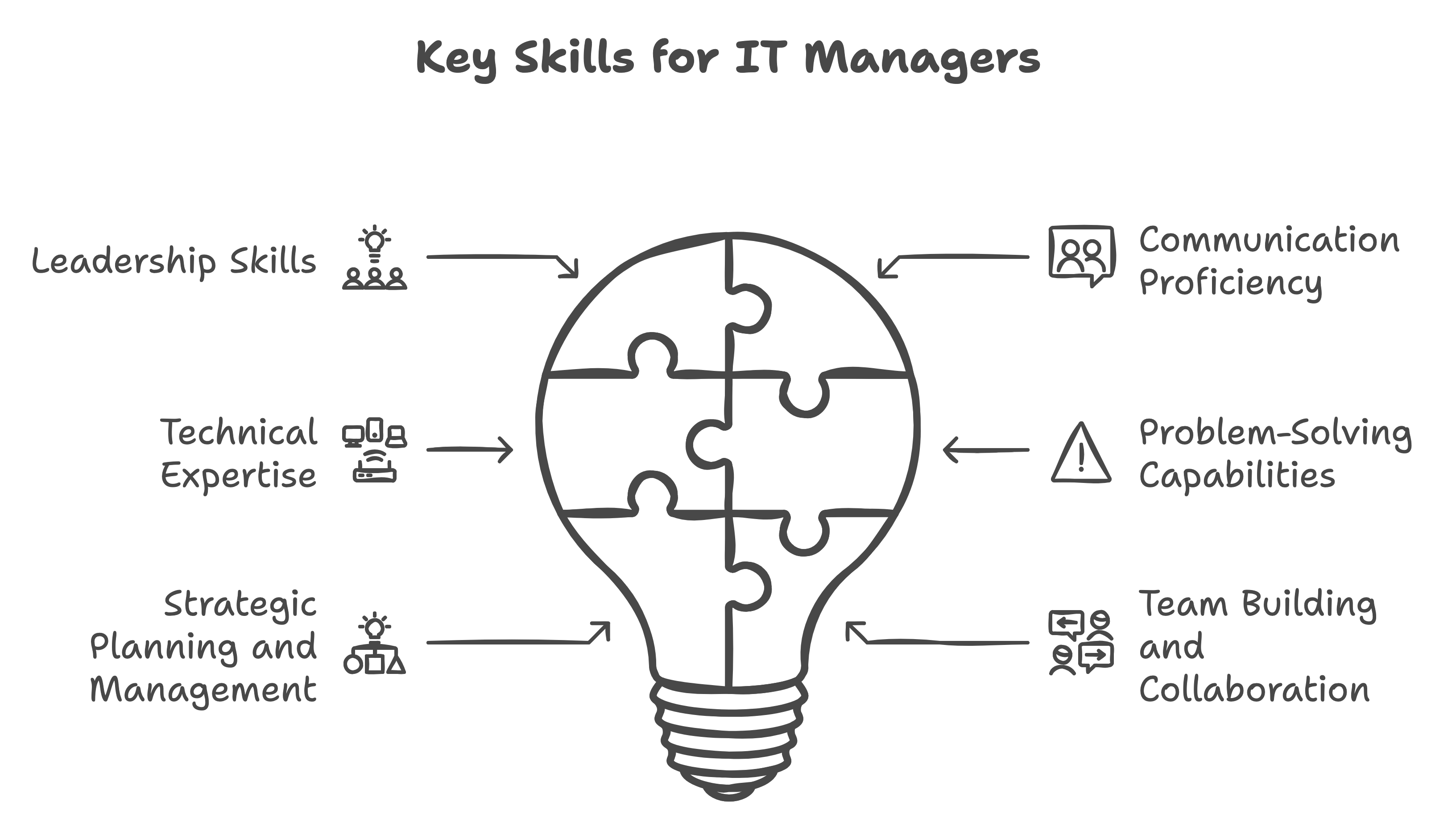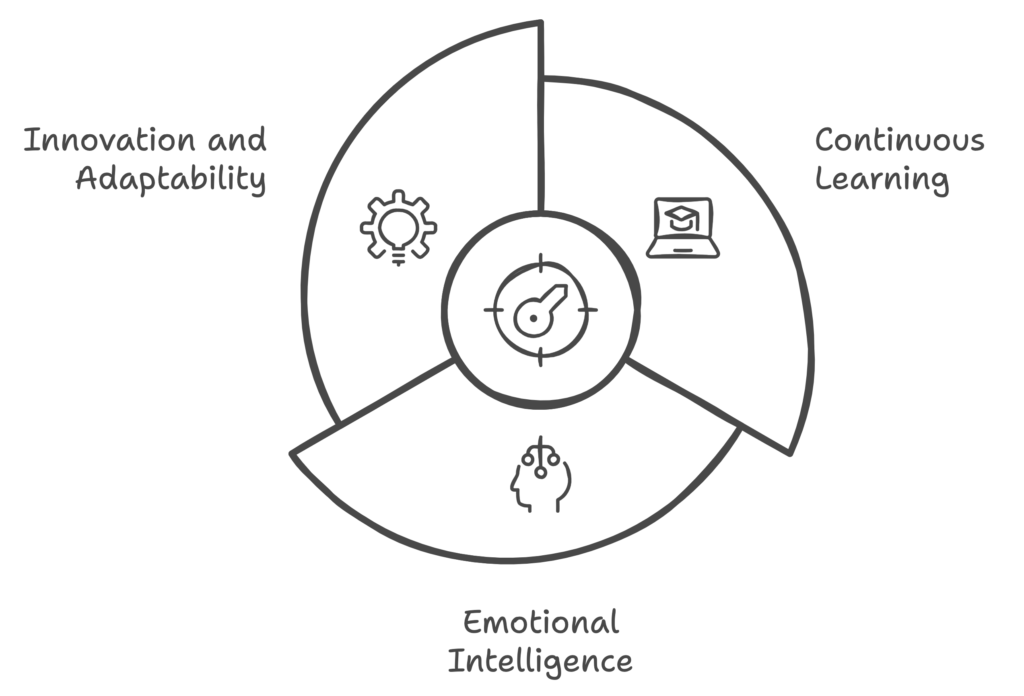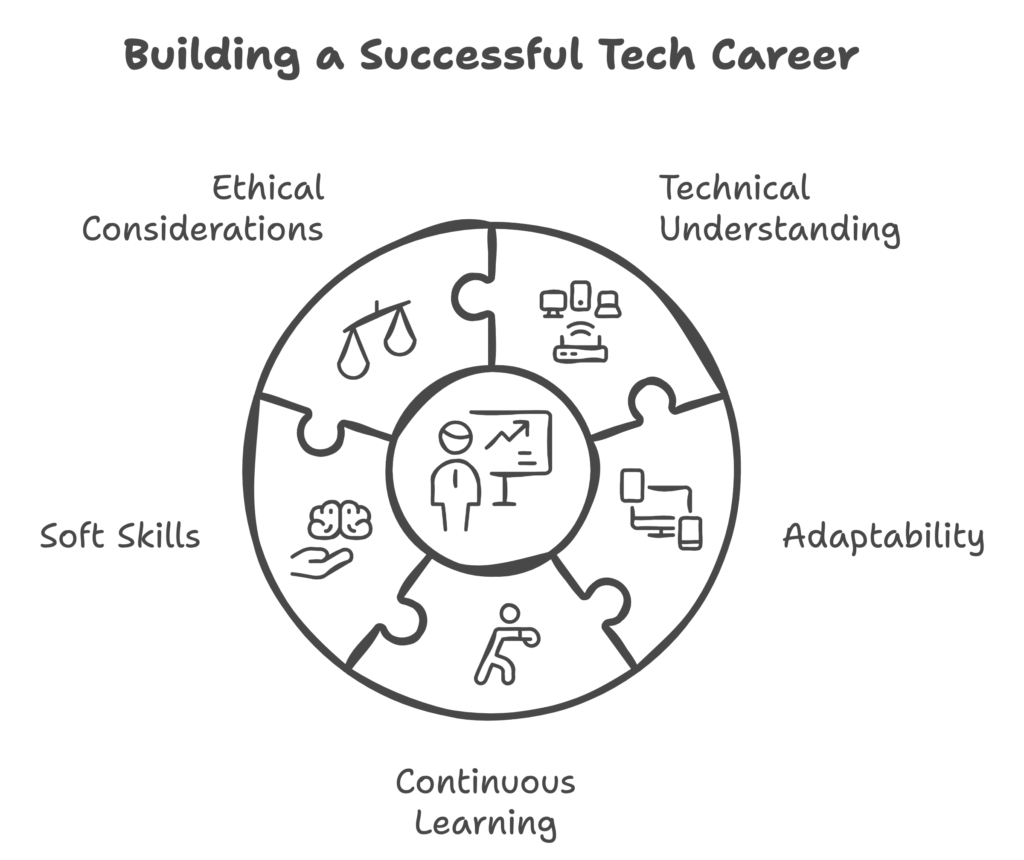In the fast-paced and ever-evolving world of information technology, IT managers play a crucial role in ensuring the success of organizations. To excel in this dynamic field, mastering essential skills is imperative. These key skills not only empower IT managers to navigate complex technological landscapes but also enable them to lead their teams effectively. From technical expertise to strategic thinking and communication prowess, a well-rounded IT manager possesses a diverse range of abilities. Join us as we delve into the 6 Essential Skills for IT Managers that every IT manager should cultivate to thrive in today’s digital age.
6 Essential Skills for IT Managers
In the ever-evolving landscape of information technology, the role of an IT manager is crucial for the success of any organization. IT managers are responsible for overseeing the implementation of IT strategies, managing IT teams, and ensuring that technology resources are utilized effectively to meet business objectives. To excel in this role, IT managers need a diverse set of skills beyond technical expertise. Let’s delve into the essential skills every IT manager should possess:
- Leadership Skills: Effective IT managers should be able to inspire and motivate their teams, provide guidance, and drive performance toward achieving organizational goals. Leadership also involves decision-making, conflict resolution, and fostering a positive work environment.
- Communication Proficiency: Clear communication is key in IT management. IT managers must be able to convey complex technical information in a way that non-technical stakeholders easily understand. Apart from verbal communication, written communication skills are also vital for documenting processes, reports, and strategies.
- Technical Expertise: While not the only requirement, a solid foundation in technical knowledge is essential for IT managers to make informed decisions and provide guidance to their teams. Staying updated with the latest technological trends and advancements is crucial to lead IT projects and teams effectively.
- Problem-Solving Capabilities: IT environments are rife with challenges and roadblocks. IT managers need strong problem-solving skills to identify issues, develop solutions, and implement them effectively. Critical thinking, analytical skills, and the ability to troubleshoot complex problems are essential in resolving IT-related issues.
- Strategic Planning and Management: IT managers must have a strategic mindset to align IT initiatives with the overall business strategy. They should be able to plan for the long term while also handling day-to-day operations efficiently. Strategic planning involves setting goals, prioritizing tasks, allocating resources effectively, and adapting to changes in the IT landscape.
- Team Building and Collaboration: Building a cohesive IT team is essential for achieving organizational objectives. IT managers should focus on fostering a collaborative work environment, promoting teamwork, and recognizing individual contributions. Encouraging professional development and providing opportunities for skill enhancement within the team is also crucial.

Mastering these essential skills can set IT managers on the path to success in today’s dynamic and demanding IT landscape. Continuous learning, adaptability to change, and a people-centric approach are key factors that can help IT managers thrive in their roles and drive innovation within their organizations.
Leadership Skills
Effective team leadership is the cornerstone of any successful organization. A great team leader possesses a unique set of qualities and undertakes specific actions that inspire, motivate, and guide their team toward success. Communication, a vital component of effective team leadership, ensures that information flows seamlessly, ideas are exchanged freely, and everyone is on the same page. Motivation, another key aspect, involves understanding what drives each team member and using that knowledge to boost morale and productivity. Delegation is also crucial, as it empowers team members, fosters trust, and allows the leader to focus on high-priority tasks. Conflict resolution skills are equally important, as they help in addressing disagreements constructively, maintaining a positive team dynamic, and preventing conflicts from escalating.
Strategic Vision and Goal Setting
Strategic vision and goal setting play a pivotal role in effective leadership. A leader with a clear strategic vision can steer their team or organization in the right direction, aligning efforts towards a common purpose. By creating a compelling vision that excites and motivates others, leaders can inspire commitment and drive progress. Setting achievable goals is equally essential, as it provides a roadmap for success and enables team members to track their progress. Developing strategies to accomplish these goals involves careful planning, resource allocation, and risk management. A leader’s ability to articulate a strategic vision set ambitious yet realistic goals, and devise actionable strategies is instrumental in driving growth and achieving long-term success.

Enhancing Leadership Skills Through Continuous Learning
Continuous learning is a fundamental aspect of effective leadership. Great leaders understand that the business landscape is constantly evolving, and to stay ahead, they must continuously acquire new knowledge and skills. By investing in their personal and professional development, leaders can broaden their perspectives, adapt to change, and remain innovative in their approaches. This commitment to learning not only enhances their capabilities but also sets a positive example for their team members, encouraging a culture of growth and development within the organization.
Emotional Intelligence and Empathy in Leadership
Emotional intelligence and empathy are two key traits that distinguish exceptional leaders. Leaders with high emotional intelligence can effectively manage their emotions and understand the feelings of others, leading to better interpersonal relationships and effective communication. Empathy, the ability to relate to and empathize with others’ experiences, allows leaders to connect on a deeper level with their team members, fostering trust, collaboration, and a supportive work environment. By incorporating emotional intelligence and empathy into their leadership style, individuals can create a more inclusive and harmonious workplace where team members feel valued and understood.
Innovation and Adaptability: Navigating Change and Driving Growth
Leaders must embrace innovation and adaptability to navigate change and drive growth. Innovation involves cultivating a culture of creativity, experimentation, and forward-thinking within the organization. Leaders encouraging innovation empower their team members to think outside the box, explore new ideas, and take calculated risks to achieve breakthrough results. Additionally, adaptability is crucial for leaders to respond effectively to unexpected challenges, changing market trends, and technological advancements. By staying agile and open to change, leaders can position their organization for success in dynamic and volatile environments.
Communication Proficiency
Clear and Concise Communication:. Mastering the Art of Transmitting Ideas
Effective communication is the cornerstone of success, whether in personal relationships or professional endeavors. The ability to convey information clearly and concisely not only ensures that the message is understood but also plays a pivotal role in averting misunderstandings and conflicts. Where information overload is rampant, mastering the art of clear and concise communication is more important than ever.
To excel in clear and concise communication, one must first understand the audience they are addressing. Tailoring the message to suit the recipients’ knowledge level and preferences can significantly enhance communication effectiveness. Utilizing simple language, structuring information logically, and avoiding unnecessary jargon are key strategies to ensure clarity.
Moreover, incorporating visual aids such as charts, graphs, or diagrams can further enhance the clarity of the message, especially when dealing with complex information. These visual representations not only help simplify concepts but also aid in retention and understanding.
Active Listening Skills: The Power of Listening with Intent
Communication is a two-way street, and active listening is the unsung hero of effective communication. Beyond merely hearing words, active listening involves fully concentrating on the speaker, comprehending the message, providing meaningful responses, and retaining the information shared. This skill not only demonstrates respect for the speaker but also fosters deeper connections and mutual understanding.
To hone active listening skills, individuals must practice empathy and strive to see the world from the speaker’s perspective. Maintaining eye contact, nodding to show understanding, and asking clarifying questions are simple yet powerful techniques to signal active engagement. By listening attentively and without judgment, one can cultivate trust, build stronger relationships, and resolve conflicts more effectively.
Furthermore, paraphrasing the speaker’s words to confirm understanding and reflecting on the underlying emotions expressed can demonstrate a deeper level of engagement and empathy.
Clear and concise communication and active listening skills form the bedrock of effective interpersonal interactions. By continuously refining these essential skills, individuals can navigate complex social landscapes with confidence and empathy, paving the way for meaningful connections and successful collaborations.
Technical Expertise
Having strong technical expertise is crucial for professionals in various fields. From software developers to data analysts, possessing in-depth technical understanding is a key asset.

In-depth Technical Understanding
Having an in-depth technical understanding entails more than just surface-level knowledge. It involves deeply comprehending the tools, languages, frameworks, and processes relevant to one’s field. Professionals with a strong technical foundation can troubleshoot complex issues, propose innovative solutions, and contribute significantly to their projects. Furthermore, a profound technical understanding enables professionals to anticipate industry trends, make informed decisions, and drive successful outcomes.
Adaptability to Technological Advancements
Technology is constantly evolving, with new advancements and trends emerging regularly. Professionals must stay abreast of these changes and adapt their skills and knowledge accordingly. Those who embrace technological advancements can gain a competitive edge in their careers and remain relevant in an ever-changing industry. Moreover, adaptability fosters creativity and resilience, allowing professionals to navigate challenges and seize opportunities presented by new technologies.
Continuous Learning and Skill Enhancement
Continuous learning is integral to enhancing technical expertise and adapting to technological advancements. Professionals can engage in online courses, workshops, and industry conferences to expand their knowledge base and stay current with the latest developments. Embracing a growth mindset and seeking opportunities for skill enhancement is essential for long-term success in a rapidly evolving tech landscape.
Future Outlook and Career Opportunities
As technology continues to shape various industries, the demand for professionals with strong technical expertise and adaptability will persist. Organizations seek individuals who can drive innovation, implement cutting-edge solutions, and navigate digital transformations. By prioritizing technical proficiency and openness to change, professionals can position themselves for rewarding career opportunities and contribute meaningfully to advancing technology-driven initiatives.
The Intersection of Technical Expertise and Soft Skills
While technical expertise is fundamental, the ability to communicate effectively, collaborate with diverse teams, and demonstrate leadership qualities is equally important. Professionals who balance their technical acumen with strong, soft skills are well-positioned to excel in dynamic work environments. Cultivating interpersonal skills, problem-solving abilities, and adaptability alongside technical prowess can lead to holistic professional growth and career advancement.
Ethical Considerations in Technical Decision-Making
In the realm of technology, ethical considerations play a significant role. Professionals with technical expertise must navigate ethical dilemmas, prioritize data privacy and security, and uphold ethical standards. Understanding the ethical implications of technological decisions and adhering to ethical guidelines is imperative for building trust with users, stakeholders, and the broader community.
Problem-Solving Capabilities
Analytical Thinking and Decision-Making
Analytical thinking and decision-making are crucial skills in problem-solving. This section will explore how these skills can be honed and applied effectively in various scenarios. From breaking down complex problems into manageable parts to evaluating different solutions, analytical thinking plays a pivotal role in making sound decisions.
Critical Thinking in Troubleshooting
Critical thinking is a key component of troubleshooting effectively. By questioning assumptions, considering alternative perspectives, and approaching problems systematically, individuals can enhance their problem-solving capabilities. This segment will explore the importance of critical thinking in the troubleshooting process and provide insights on cultivating this skill.
Enhancing Analytical Skills through Practice
Analytical thinking and decision-making are not innate abilities but skills that can be developed over time. One effective way to enhance these skills is through regular practice. By engaging in activities that require critical analysis and decision-making, individuals can sharpen their analytical skills and become more adept at solving complex problems.
Utilizing Data and Information
The ability to gather, analyze, and interpret data is essential for effective problem-solving. By utilizing data and information, individuals can make informed decisions and identify patterns that may not be immediately apparent. This section will discuss the importance of data in problem-solving and provide tips on how to leverage data effectively.
Collaborative Problem-Solving
Collaboration plays a significant role in problem-solving, allowing individuals to leverage diverse perspectives and expertise. By working together with others, individuals can approach problems from different angles and come up with innovative solutions. This section will explore the benefits of collaborative problem-solving and provide strategies for effective teamwork in problem-solving scenarios.
Enhancing Problem-Solving Skills Through Technology
In the digital age, technology has become an integral part of problem-solving. From advanced analytics tools to collaborative platforms, technology offers numerous resources to streamline the problem-solving process. This segment will explore how technology can enhance problem-solving capabilities and discuss the importance of staying updated on technological advancements.
Real-World Application of Problem-Solving Skills
Problem-solving skills are not limited to the workplace; they are valuable in various aspects of life. From personal challenges to community issues, individuals can apply problem-solving capabilities to effect positive change. This section will highlight real-world examples of problem-solving in action and showcase the impact of effective problem-solving in different contexts.
Strategic Planning and Management
Strategic planning and management play a pivotal role in shaping the success of organizations, especially in the realm of Information Technology (IT). This blog section explores the critical aspects of aligning IT strategies with business objectives and the importance of developing comprehensive long-term IT plans to drive organizational growth and innovation.
Aligning IT Strategies with Business Objectives
- Significance of aligning IT strategies with business objectives
- How IT strategies can directly impact business performance and competitiveness
- Strategies for ensuring seamless alignment between IT and business objectives
- Real-world examples illustrating the benefits of a well-aligned IT strategy
Developing Long-term IT Plans
- Understanding the strategic importance of long-term IT planning
- Components of a robust long-term IT plan, including scalability, flexibility, and innovation
- Best practices for creating and implementing sustainable long-term IT strategies
- Addressing potential challenges and risks associated with long-term IT planning and execution
By fostering a deep understanding of strategic planning and management in IT, organizations can gain a competitive edge, drive operational efficiency, and foster a culture of continuous innovation. The alignment of IT strategies with overarching business goals not only enhances organizational agility but also enables proactive responses to evolving market trends and technological advancements. Moreover, developing comprehensive long-term IT plans empowers organizations to adapt to changing business landscapes, seize new opportunities, and mitigate potential risks effectively.
In essence, strategic planning and management are the cornerstone for sustainable growth and success in the digital age. By embracing strategic foresight, leveraging innovative technologies, and fostering collaboration between IT and business stakeholders, organizations can navigate complexities, drive value creation, and chart a path toward long-term prosperity.
Leveraging Data-Driven Insights
- Harnessing the power of data analytics for informed decision-making
- Implementing data-driven strategies to enhance operational efficiency
- Utilizing predictive analytics to forecast market trends and customer behavior
- Case studies showcasing successful data-driven initiatives leading to business growth and competitive advantage
Embracing Agile Methodologies
- Understanding the principles of Agile methodology in IT projects
- Benefits of Agile approaches in fostering adaptability and responsiveness
- Agile tools and frameworks for effective project management
- Real-world examples of organizations achieving project success through Agile implementation
Conclusion
Possessing these essential skills outlined in this blog is crucial for any IT manager looking to excel. From technical expertise to soft skills like communication and leadership, a well-rounded IT manager must continually hone these skills to navigate the ever-evolving landscape of technology and business. By mastering these skills, IT managers can effectively lead their teams, drive innovation, and contribute to the overall success of their organizations.
Leadership skills are essential for guiding teams, driving organizational success, and inspiring positive change. Effective team leadership, strategic vision, continuous learning, emotional intelligence, empathy, innovation, and adaptability are key components that contribute to strong leadership. By honing these skills and qualities, individuals can become impactful leaders who motivate their teams, achieve strategic objectives, and lead their organizations to long-term prosperity and growth.
By exploring the significance of technical expertise, adaptability to technological advancements, continuous learning, soft skills development, and ethical considerations, this blog section underscores the multifaceted nature of excelling in the tech industry. Embracing a holistic approach to professional growth that combines technical prowess with interpersonal effectiveness and ethical consciousness is key to thriving in a digitally-driven world.
Problem-solving capabilities are essential skills that can be honed through practice, data utilization, critical thinking, collaboration, and embracing technology. By developing a holistic approach to problem-solving that encompasses analytical and critical thinking, leveraging data, collaborating effectively, and applying skills in real-world scenarios, individuals can become adept at tackling challenges and making informed decisions in diverse environments.
By integrating data-driven insights and Agile methodologies into strategic planning and management processes, organizations can further optimize their IT strategies, enhance operational performance, and drive innovation rapidly. The synergy between strategic foresight, data analytics, Agile methodologies, and effective stakeholder collaboration forms the foundation for resilient and future-ready organizations poised for sustained success in an ever-evolving digital landscape.





